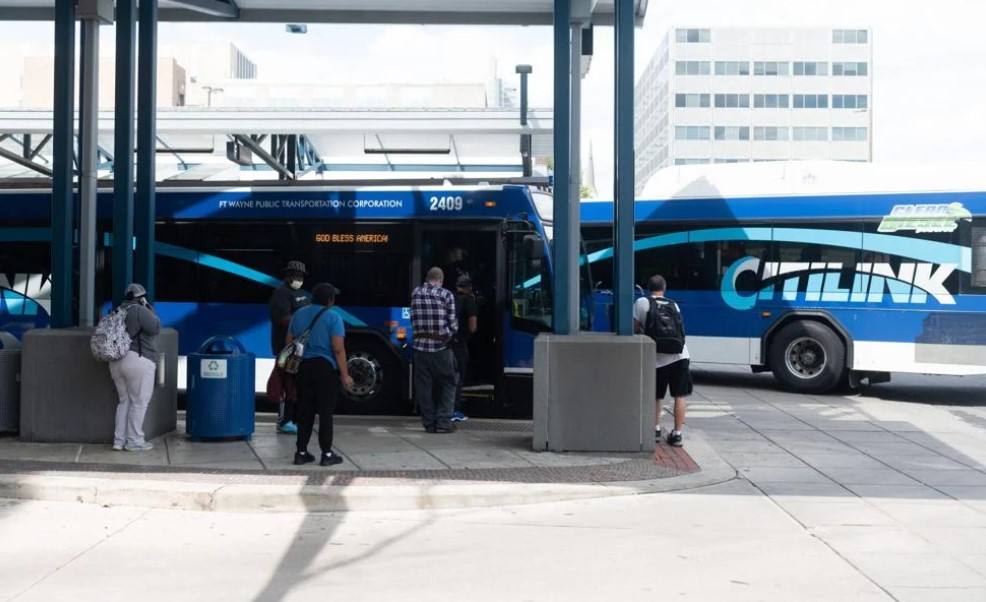Editor’s Note: This article originally appeared in the October 23, 2024 edition of the Journal Gazette. If you would like to access the article at the source, please click HERE or read below. Thank you!

People board a Citilink bus at Central Station on Baker Street. Stan Sussina | The Journal Gazette
On Tuesday evening, Fort Wayne City Council handed Citilink a patched spare tire to keep the service rolling for another year. This temporary measure buys the public transportation agency time to address its $2.5 million budget deficit and avoid immediate service cuts.
However, this stopgap only postpones a deeper discussion about the long-term sustainability of a transit system that provided 1.6 million passenger rides last year. Operational efficiency will be critical, and Citilink has already taken steps in that direction. The agency’s board recently approved the first fare increase since 2008, set to take effect in 2025. The regular adult fare on fixed routes will rise 20%, from $1.25 to $1.50, generating an estimated “net budget impact of $598,000 in new revenue and cost savings.”
The initial budget proposal included a special levy that would have set back taxpayers between $3 and $12 annually, diverting $850,000 from the city budget and forcing departments to compete for already-limited resources. Thankfully, council members found compromises to get the job done.
Third District Councilman Nathan Hartman’s amendment capped Citilink’s request at $500,000, requiring the agency first to draw from its $978,000 cash reserve and $1.6 million Rainy Day Fund. Meanwhile, 6th District Councilwoman Rohli Booker, a Citilink board member, introduced an amendment to remove the cap, allowing the agency to request additional funds with council approval.
During council discussions, transparency and accountability emerged as key concerns. Citilink is now required to provide quarterly financial updates.
While the council’s actions offer a balanced short-term solution, they only highlight deeper problems. Citilink’s financial challenges are rooted in a flawed funding structure. Years ago, the Indiana General Assembly decoupled public transit funding from sales tax revenue, triggering service reductions that set off a vicious cycle of declining ridership and revenue.
According to the 2023 state Department of Transportation report, Citilink relies more heavily on local assistance — 47% of its budget — than its peers across the state, while state funding accounts for just 12%, far less than the statewide average of 20.4%. This imbalance underscores the urgent need for Indiana lawmakers to rethink their approach to public transit funding.
Citilink must also work actively with legislators to secure more equitable state funding. Even if going forward with more transparency required of it by the City Council, an indifferent state legislature could tank public transportation vital to the city’s functioning. Again, 1.6 million passenger rides ought not be dismissed with a sigh and an eye roll.
If Indiana intends to honor its “state that works” motto, it must provide sustainable funding for transit systems such as Citilink. Reliable transit strengthens communities, supports economic growth and ensures residents can access jobs, education and essential services.
Four of the five Republicans on City Council, including fiscal hawk Russ Jehl (R-2nd), ratified the budget realizing Citi-link’s survival is important. Jehl believes the real contributor to the founding gap is not local.
“Rather, the funding gap is from the state, which has been steadily cutting funding in real terms,” he told The Journal Gazette Wednesday afternoon. “If we as a community want viable public transit, we need to support Citilink’s efforts in the Statehouse, and council has pledged in bipartisan fashion to be of assistance.”
Bailouts must not become a permanent strategy — for the city or the agency. Lawmakers must acknowledge that a stable, efficient public transit system is not a luxury but a shared investment in the future.
The next step is clear: city leaders, transit officials and residents must work together to push the state legislature for sustainable funding. Citilink needs more than just patched spare tires — it needs a long-term solution to keep public transportation running smoothly for years to come.

